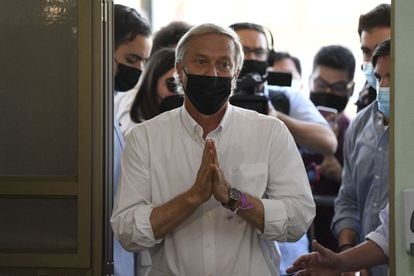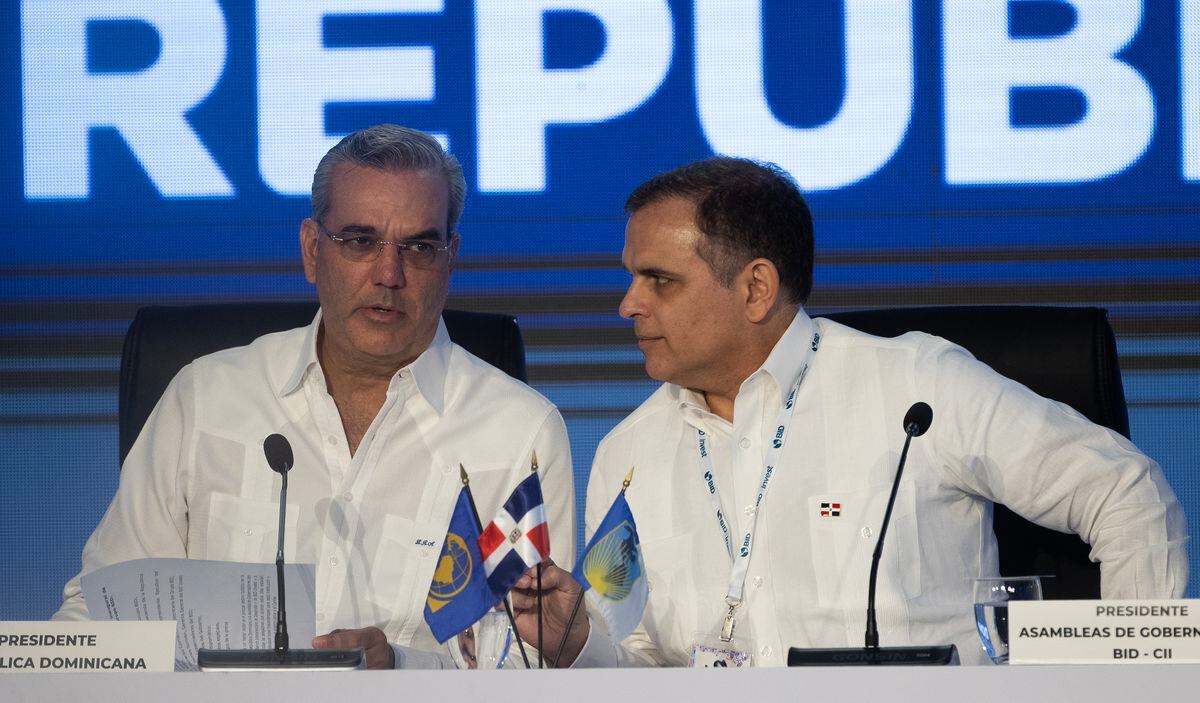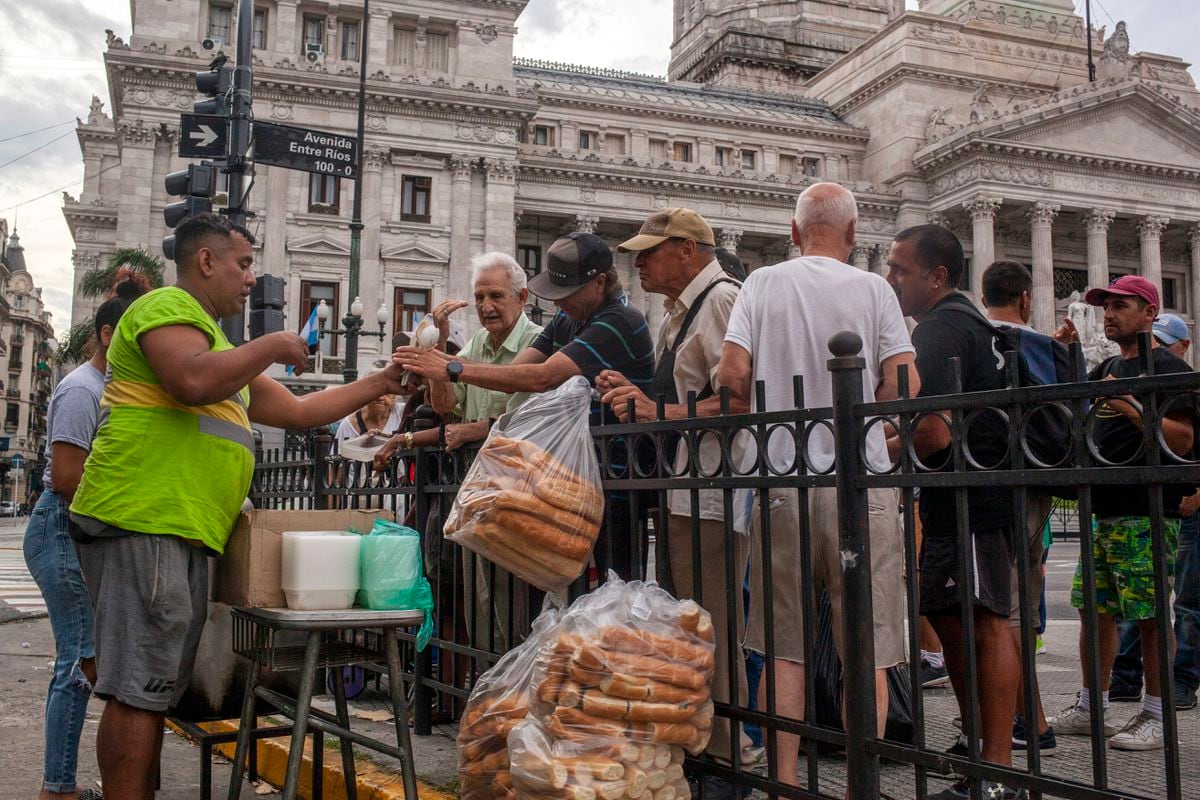The diagnosis of the season is that Latin America turns to the left.
The numbers have another version: of the last 16 competitive elections that took place in the region, eight ended up in the hands of the right or center-right and the rest on the opposite sidewalk.
However, the triumphs of Xiomara Castro in Honduras, of Pedro Castillo in Peru and, especially, the impact of Gabriel Boric's vast victory in Chile have been decisive for the sensation of a leftist wave.
However, in the spirit of a shipwreck researcher, I would like to approach here the reverse of that wave: What is happening on the continental right?
Make Latin America great again
The election of Jair Bolsonaro in 2018 uncovered something new in Latin America. After decades in which the right was assimilated into the universe of the Washington Consensus —essentially, recipes for economic liberalization—, the Brazilian president brandished an agenda in which economic concerns paled in the face of a reactionary impetus in the social, cultural and political spheres. Helped by the example of Trump and the new anti-progressive rebellions that the historian Pablo Stefanoni has studied, a peculiar right was emerging.
The momentum spread in the region and was dressed as anti-communism.
Curiously, to defend freedom, Bolsonaro and Kast expressed admiration for the dictatorships of the seventies.
While in Peru, Keiko Fujimori vindicated her father's government which, in many ways, was the late version of those military regimes.
The Latin American right, in short, unfroze the arsenal of the cold war and went out to wage the "cultural battle" against communism.
Interestingly, to defend freedom, Bolsonaro and Kast expressed admiration for the dictatorships of the seventies”
But his last three electoral attempts failed. In Honduras, the cry of “fatherland yes, communism no” against Xiomara Castro was unsuccessful; in Peru, to prevent the country from becoming
Peruzuela
, the right wing gave new meaning to Keiko Fujimori, who came to personify freedom; and in Chile, to prevent it from becoming
Chilezuela
, Kast and the right believed that it would suffice to summon the old anti-communism. They lost in every case.
It is not surprising that these proposals that seem to seek to turn back the clock of history fail. On the one hand, fear is a feeling that can eventually lead to electoral victory, especially in societies with fragmented political systems and in which two-thirds of citizens consider that all politicians are corrupt, as the 2021 Lapop survey points out. However, it is a feeling with which a common horizon or a possibility of substantive improvements is not built.
Now, more important than the anti-communism of election seasons, are the retardancy pretensions that support these proposals.
Like the repeated assessment of the “family” that, in a veiled way —and sometimes not so much—, seeks to keep women at home, or the explicit rejection of sexual diversity.
Or stir up xenophobia, relativize racism or pay homage to VOX, the Spanish party that has grown promoting exclusions of different kinds.
A right, in short, that points neither to the future nor to integration.
Perhaps no data condenses it better than the percentage of women under 30 who voted for Boric: 70%.
Followers of Keiko Fujimori during the protests for alleged electoral fraud in Peru, in June 2021. Paolo Aguilar (EFE)
In other words, even rejecting Trump, it is understandable that in the United States there is a sector that yearns for some America of the past (when being white provided some kind of guarantee in life, when there was work in the mines, when the unions were strong), but going in search of the golden age in which Latin America was exemplary is simply ridiculous.
Better manage the status quo
There is also another right on the continent, a legacy of neoliberalism three decades ago. Pedro Pablo Kuczynski in Peru, Sebastián Piñera in Chile, Guillermo Lasso in Ecuador and, with some differences, Mauricio Macri in Argentina, have in recent years embodied a managerial right determined to revive the reforms of the Washington Consensus. In countries like Argentina and Ecuador it means patching up the pre-Correista and pre-Kirchnerist world, which hardly excites the citizenry. In Peru, in Chile, and in Duque's Colombia, it appears as a promise to do the usual, but a little better.
However, success eluded the president-managers: Kuczynski was unable to stay in power, accused of doing business with Odebrecht; Piñera declared war on his people and later it was learned that some of his policies paid off for his family in the British Virgin Islands; Macri, who had said that inflation could be solved in a flash, failed to get the Argentine economy back on track and lost re-election.
In addition—and perhaps above all—they demonstrated a tremendous disconnection with their countries.
They rescued bombastic surnames, they seemed to bet on a de facto plutocracy, while deepening what Viridiana Rios calls, for the Mexican case, the "güeritocracy".
As if that were not enough, their names usually appear in the
papers
that tax havens segregate from time to time.
In short, a right wing that embodies a Latin American minority that, in its luxury schools, its gated neighborhoods and its exclusive clubs, does not learn to be a citizen of their countries, but owners of their countries.
The challenge
Various political science investigations have shown that the establishment of conservative parties has been crucial for the institutionalization of democracies in Europe and Latin America. So our democracies need a right (and a left, for that matter, in these polarized days). But we are not served by a
saudacious
right of military dictatorships or another nostalgic of that time when neoliberalism was a renovating outburst. The right is obliged to invent something future. And crosswise.
Not only for a matter of electoral strategy.
Although terror as a slogan has recently lost in several countries, Brazil shows that when it triumphs it leads to a government misfortune: significant inflation, the economy languishes and, after more than six hundred thousand deaths from the pandemic, Bolsonaro still does not get vaccinated and now He fights the immunization of children because he is unaware that someone between 5 and 11 years old has died from covid.
You don't have to be a Maoist to reject such a failure.
José Antonio Kast, former candidate for the presidency of Chile. Mauro Pimentel (AFP)
However, throughout the region the right explains its drift with an argument something like this: "We are doing badly because the left won the battle of ideas and monopolized the story." What intellectual laziness! Like the evil genius of Descartes, the left would have
brainwashed
people. And this is wrong. Various political scientists in recent years have shown that shifts to the left or to the right are political phenomena, but not social ones: the values of Latin American society have not shifted significantly either to the left or to the right.
In addition to being wrong, it is a condescending, arrogant argument. It disqualifies criticism and the desire for change in a continent in which 34% of the population lacked sufficient food during 2021. On the other hand, the explanation ignores that in the region there is also a very strong "story" of capitalism and entrepreneurship. But instead of critical examination they lull themselves into an aristocratic defeatist explanation. Which, by the way, enlists another more dangerous one: democracy is the problem.
The right should offer something better to Latin America. Among other things, because the left has not achieved it. In its relationship with democracy, for example, we know that authoritarian factions exist in both stores. And in terms of results, there is not a single substantive issue on which we can say with certainty that the left or the right has been more effective than the other in the region. Could anyone point out a recurring pattern that suggests that some respond better to citizen insecurity? And isn't it true that, among those who managed to reduce inequality on the continent, we find countries that stayed to the right and also to the left?
We have a right that is more interested in
laissez-faire
than in competition;
a right that has confused being liberal with being pro-rich”
The right needs to recover initiative and some convening agendas.
One among others, for example, should be the purpose of building competitive capitalism.
But he is absent.
We have a right that is more interested in
laissez-faire
than in competition;
a right that has confused being liberal with being pro-rich.
what's coming
This year there will be elections in Brazil, Colombia and Costa Rica. In the country of the future, the moderate right seeks to get rid of Bolsonaro without falling back on the PT. At the moment, it does not seem possible because Sergio Moro does not take off. Lula da Silva licks his lips. Everything indicates that he has attracted Geraldo Alckmin, a former politician from the PSDB (centre-right), former governor of Sao Paulo, and who also ran for the Brazilian presidency in 2006 against Lula. Will the left and the right united never be defeated? Lula understands those alchemies.
In Colombia, the reactionary right seems to be on the wane. Former President Uribe, who dominated the scene for more than two decades, is now the most rejected politician in the country. The far-right senator María Fernanda Cabal failed to be the candidate of Uribismo. Everything points to the fact that the scarecrow of "Castrochavism" has run out. The results in Peru, Honduras and Chile suggest that it is not worth reviving. What seems to take shape is a right-wing coalition called "team for Colombia", which, if it does not show brilliance, neither does it show shrillness, obeisances to VOX or a desire to crumble basic democratic conquests. However, whether the right remains on this path will depend on the second round, which often, paradoxically, exacerbates the spirits instead of calming them down. If in that instance they faced Gustavo Petro,the candidate of the left, the high sounds of fear could be reincorporated. Which will be associated, of course, with how Petro behaves.
The Colombian senator, María Fernanda Cabal, in an image of her social networks.RR.
H.H.
Because, ultimately, there are more options to have democratic rights and lefts together than each one on its own.
And here, as in so many things, Uruguay is an example and an exception.
Although an extreme right-wing party (Cabildo Abierto) has emerged in recent years, President Lacalle does not deny his liberalism.
It does not build its platform on promises of exclusion or on the disloyal disqualification of the Broad Front.
And these do not shout fascist.
Lacalle is prevented from seeking re-election, but the important thing is that in the next presidential election, both the probable candidates of the FA and those of the White Party would be excellent options in most Latin American countries.
And now I remember that John Stuart Mill defended that a healthy political system is one where a party of progress and another of stability alternate. From so much talking about right and left, we have lost sight of the fact that the biggest prize is in a system that reinforces one and the other. For that, it is required that the pluralist sectors, from the right or the left, do not run after cave claims, no matter how innovative and
trendy
they may be. It is not what has happened on the right. And as the cases of Brazil, Peru and Chile show, this has generated significant costs in the short term. It remains to be seen if a concern for the medium term can germinate in our civilization of immediacy.
Alberto Vergara
is a Peruvian political scientist and academic researcher.
He is a professor at the Universidad del Pacífico, Lima.


/cloudfront-eu-central-1.images.arcpublishing.com/prisa/RHYRDMQQ7BG5JOUSKAXBLKE6YE.jpg)
/cloudfront-eu-central-1.images.arcpublishing.com/prisa/GZBJJXO3EZE2HLSP5ZRRKYYYOY.JPG)


/cloudfront-eu-central-1.images.arcpublishing.com/prisa/W33JSXVPKRF7FMDYEETPSPNNKY.jpg)
/cloudfront-eu-central-1.images.arcpublishing.com/prisa/EMYXC3EVHNEG3OJHGIQCB2IVYA.jpg)
/cloudfront-eu-central-1.images.arcpublishing.com/prisa/Q6UJ4IEP6ZGLZLS3MSHF7LNYOU.jpg)


/cloudfront-eu-central-1.images.arcpublishing.com/prisa/KMEYMJKESBAZBE4MRBAM4TGHIQ.jpg)



